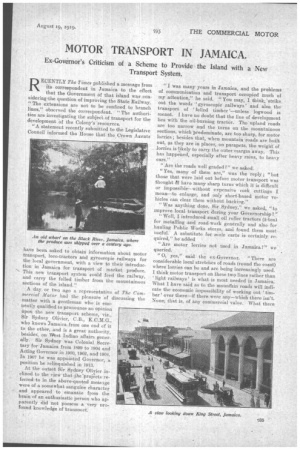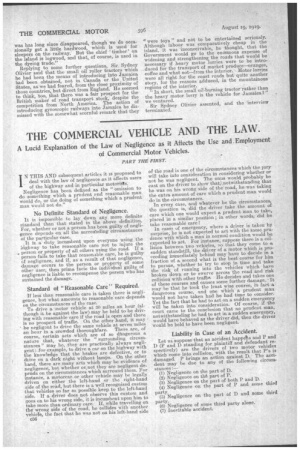MOTOR TRANSPORT IN JAMAICA.
Page 13

Page 14

If you've noticed an error in this article please click here to report it so we can fix it.
Ex-Governor's Criticism of a Scheme to Provide the island with a New Transport System.
RECENTLY The Times published a message from its correspondent in Jamaica to the effect that the Government of that island was considering,the question of improving the State Railway. "The extensions are not to be confined to branch lines," observed the correspondent. "The authorities are investigating the subject of transport for the development of the Colony's resources.
"A statement recently submitted to the Legislative Council informed the House that the Crown _Agents have been asked to obtain information about motor -transport, loco-tractors and gyroscopic railways for the local government, with a view to their introduction in Jamaica for transport of market produce. 's This new transport system could feed the railway, and carry the felled timber from the mountainous sections of the island.", A day • or two ago a representative of The Commercial Motor had the pleasure of discussing the matter with a gentleman who is eminently qualified to pronounce an opinion Upon the new transport scheme, viz., Sir Sydney Olivier, (LB., who knows Jamaica from one end ef it -to the other, and is a great authority, besides, on West Indian affairs generally. Sir Sydney wasColonial Secretary for Jamaica from 1899 to 1904 and Acting Governer in 1900, 1902, and 1904.
• In 1907 he was appointed Governor, a position he relinquished in 1913. At the outset Sir Sydney Olivier inclined to the view' thatjhe 'projects referred to in the above-quoted meS,sage were of a somewhat sanguine character and appeared to emanate from the brain of an enthusiastic person who apparently did not possess a very orofound knowledge of transoort "I was many years in Jamaica, and the problems of communication and transport occupied much of my attention," he said. "You may, I think,' strike out the words • gyroscopic railways' and also the transport of 'felled timber '—unless logvvood is meant. I have no doubt that the line of development lies with the oil-burning tractor. The: upland roads are too narrow and the turns on the. mountainous sections, which predominate, are too sharp, for motor lorries; besides that, when mountain roads are built out, as they are in places, on parapets, the weight of lorries is-likely to carry the outer margin away. This has happened, especially after heavy rains, to heavy cars." , "Are the roads well graded ? " we asked.
"Yes, many of them are," was the reply ; "hut those that were laid out before .motor transport was thought df have many sharp turns which it is difficult or impossible—without -expensive rock cuttings I 'mean—to enlarge, and only shortJbased motor vehicles can clear them without backing."
"Was anything done, Sir Sydney," we asked, "to improve local transport during your Governorship?"
"Well, I introduced small oil roller tractors (5-ton) for metalling and road-work generally and also for hauling Public Works stores, and found them most useful: A substitute for mule carts is certainly required," he added "Are motor lorries not used in Jarnaica.f" we queried.
"0, yes," • said the ex-Governor. "There are considerable local stretches of roads (round the coast) where lorries can be and are being increasingly used.
I think motor transport on these two lines rather than 'light railways' is what is most needed in Jamaica: What I have said as to the mountain roads will indicate the economic impossibility of working out tin-. ber ' over there—if there were any—which there isn't. None; that is, -of any conimercial value. What there was has long since disappeared, though we do occasionally get a little hardwood, which is used for sleepers on the railway. But the chief 'timber' on the island is logwood, and that,. of course, is used in the dyeing trade."
Replying to some further questions, Sir. Sydney Olivier. said that the small oil roller tractors which he had been the means of introducing into Jamaica. had been obtained, not in Canada or the United States, as we had feared, from the close proximity of those countries, but direct from England. He seemed to think, too, that -there was a fair prospect for the British maker of road transport stock, despite the competition from North America. The action of introducing gyroscopic railways into Jamaica he dismissed with the somewhat scornful remark that they
"were toys" and not to be entertained seriously. Although labour was comparatively cheap in the island, it was inconceivable, he thought, that the Government would go to the enormous expense of widening and strengthening the roads that would be necessary if heavy motor lorries were to be introduced for the transport of market produce—oranges, coffee and what not—from the interior. Motor lorries were all right for the coast roads but quite another story, for the reasons adduced, in the mountainous regions of the interior. "In short, the small oil-burning tractor rather than the heavy motor lorry is the vehicle for Jamaica 1" we ventured.
Sir Sydney Olivier assented, and the interview terminated.






















